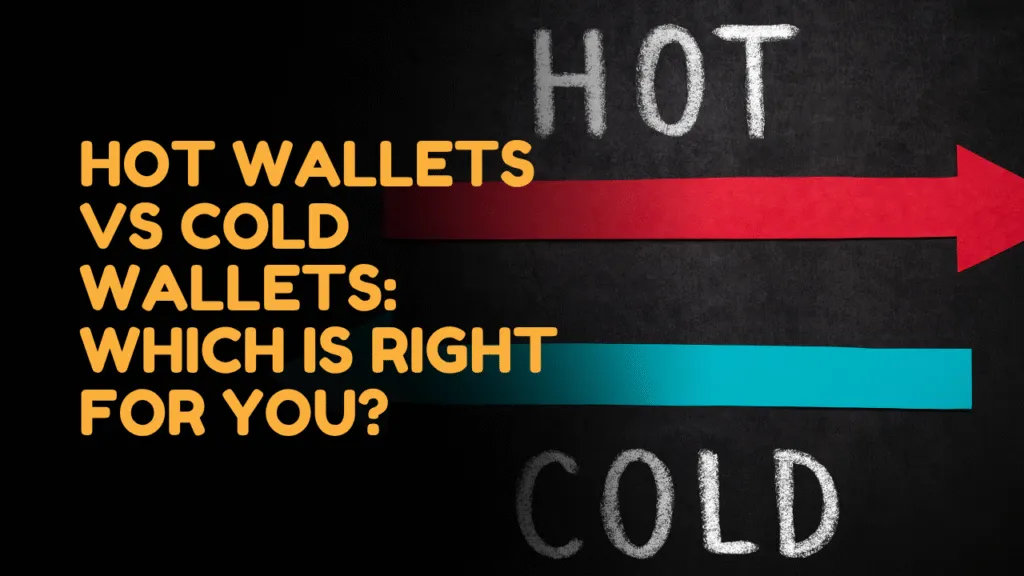Crypto wallets are like banks that not only store the money you deposit but also take responsibility for keeping it safe. These digital devices are designed to store your private keys and let you access your crypto in real-time without relying on third parties.
However, here’s one thing to remember: “Not all wallets are created equal”. Some of them stand out due to their security features and user-friendly interface, and others are preferred for long-term storage.
These factors have divided these digital wallets into two main types: “Hot Wallets and Cold Wallets”. To find out which one is right for you, it is important to know their key differences.
So, welcome to our comprehensive blog post🌸……
After reading our guide post, you will gain a clear understanding of:
- What are hot and cold wallets?
- What are their types?
- Which one should you choose( Hot wallets vs cold wallets)?
So, get ready to dive in deeply…..
What is Hot Wallets?
In cryptocurrency, Hot Wallets refer to software used to store your private keys on a device already connected to the internet. Accessible from internet-connected devices (from Smartphones to PCs), these crypto storage devices allow you to store, manage, and transact your digital assets. Additionally, they come in various types( each having a different purpose). Let’s know a few of them through their short overview.
Types of Hot Wallets
In this short section, we will overview 5 major types.
Coinbase wallets: Wallets that are supported by the Coinbase platform and used to store Bitcoin, Ethereum, and other cryptocurrencies.
Trust wallets: A Hot Wallet that is available for both web and mobile software and supports over 350+ cryptocurrencies is called Trust Wallet.
Exodus wallet: Exodus is famous for supporting a large number of cryptocurrencies(over 100) and offering a user-friendly interface.
Atomic wallets: These digital devices support at least 500+ tokens and coins and offer staking and some other options.
MetaMask: If you want support for Ethereum-based tokens, MetaMask has no match.
What is Cold Wallets?
On the other hand, Cold Wallets are those digital devices that have no internet connection to other devices and are similar to USB sticks. All in all, they offer various features, from storing, sending, and receiving tokens to accessing all your available tokens in one place. Let’s unmask some of their types.
Types of Cold Wallets
Here, we will discuss some major types.
Paper wallets: These paper-like digital crypto holders have public and private keys that are printed on them. If such a paper is damaged, you will lose access to your keys.
Hardware wallets: They often look like a thumb drive, are smart cards, or might even look like a smartphone, and hold both public and private keys.
Sound wallets: As the name suggests, these wallets save public and private keys as audio files.
Ledger Stakes: These cryptocurrency storage wallets come with a customizable touchscreen and are created for the day-to-day use of your crypto with clarity and comfort.
Hot Wallets vs Cold Wallets – Which One to Choose
Hot Wallets vs Cold Wallets: We will show their live match( discussing the factors like price, security, accessibility, and others) and declare the winner.
1. Price Consideration
The thought that runs through your mind when buying something is: It should be good and also affordable. Are we saying right? So, let’s check which one is cost-effective(save your money).
- Hot Wallets: Dear readers! You will be glad to know that these crypto storage devices are completely free. You don’t even need a single coin to buy them( mobile and even web-based wallets). Such wallet providers generate revenue through transaction fees and some affiliated services.
- Cold Wallets: Compared to Hot Wallets, cold wallets demand a huge investment. Each of them requires you to pay between $50-$400. Additionally, in most cases, you have to pay for extra updates and accessories.
Verdict: When it comes to cost, Hot Wallets are a perfect choice for you, as they let you manage your cryptocurrencies at zero cost.
2. Security
Security is one of the most notable factors when buying any wallet. It’s time to reveal which one can be a better guard for your digital assets.
- Hot Wallets: As these crypto holders are connected to the internet, they are more prone to being hacked by hackers and cybercriminals. Despite their advanced security features, such as password protection and 2FA(2-factor authentication), this internet connectivity makes them a victim to cyber threats easily.
- Cold Wallets: On the contrary, these digital crypto devices are safe and offer enhanced security to your digital assets. This is because they are used offline or without an internet connection. In short, you can store your private keys as long as you wish.
Verdict: When we talk about security, Cold Wallets take the lead, as they offer protection to your crypto assets by storing them offline.
3. Accessibility
In terms of accessibility, this comparison becomes more interesting. Here’s how;
- Hot Wallets: These crypto storage devices are easy to access and use. Their constant internet connectivity makes it easy for you to access them on your smartphones and PCs. Most Hot Wallets, such as MetaMask and Exodus, feature a user-friendly interface, ensuring you can manage your cryptocurrencies easily from anywhere.
- Cold Wallets: However, if we come to these wallet devices, the initial setup process can be very complex for many crypto users. In the case of most Cold Wallets, you have to ensure that the device is connected to your computer or mobile device through USB.
Verdict: Being easy to navigate and use, Hot Wallets stand out in terms of accessibility.
4. Loss Protection
Can there be any greater joy than recovering your assets that you have accidentally lost? Now, which one provides you with this facility? Let’s know.
- Hot Wallets: Most have good recovery options. Even if your mobile is lost or damaged, you can still access your assets through the recovery seed phrase. This feature makes them an ideal choice for those who have lost their cryptos for any reason.
- Cold Wallets: These crypto storage devices also come with recovery options. However, this option is only available in the case of losing the password. If your device is stolen or damaged, it will be very difficult for you to recover your assets.
Verdict: Both offer better recovery options. However, when having Hot Wallets, you can recover your assets even if your device is stolen. However, such a recovery( when the device is lost) is impossible with Cold Wallets.
Our Final Thoughts on Hot Wallets vs Cold Wallets
Nowadays, when there is a large number of cyber criminals on this crypto landscape, protecting your digital assets has become more important. In this case, crypto wallets appear as a possible solution that lets you securely store and manage your online assets. However, many people believe all these crypto storage devices are the same; we have brought this blog post for them.
In this article, we have comprehensively discussed Hot Wallets vs Cold Wallets by keeping some factors( security, accessibility, and loss protection) in mind. When it comes to security, Cold Wallets have no match. However, in terms of other factors, Hot Wallets stand out, making them an ideal choice for crypto users.


